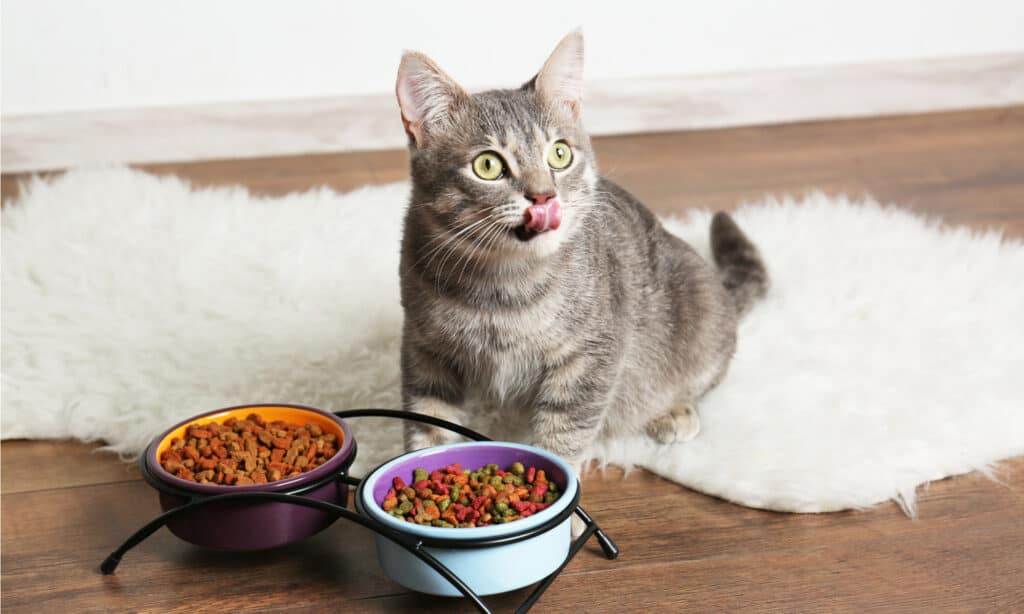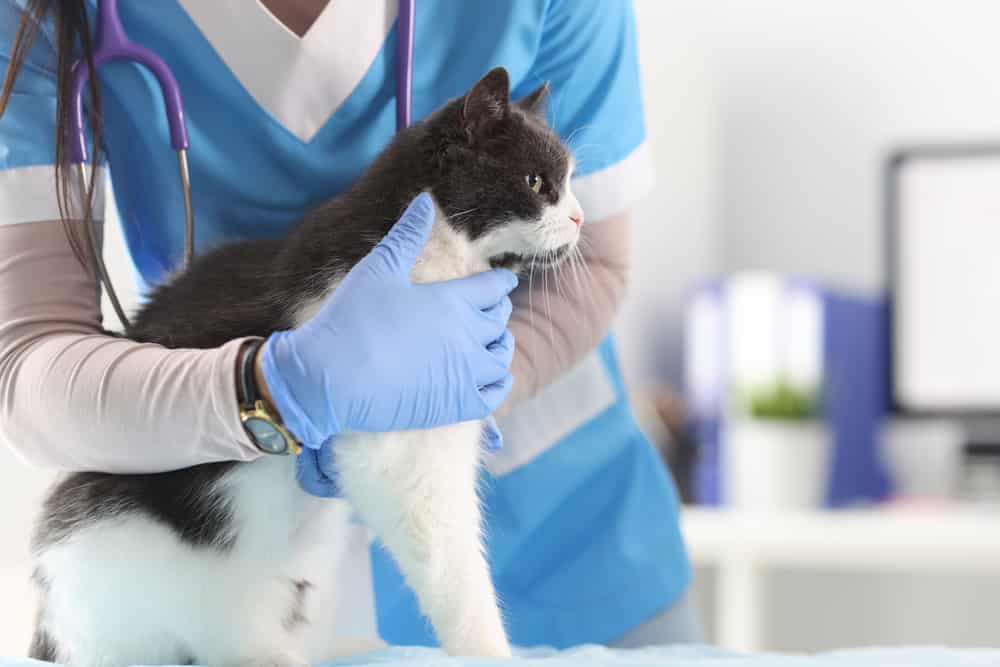Tomatoes are a delicious addition to many human diets, but the question of whether or not they are safe for cats to consume remains open. This is an issue that has puzzled veterinarians and pet owners for decades. The nutritional demands of our feline friends require that we understand the benefits and drawbacks of feeding them tomatoes.
Here, we’ll find out if tomatoes are safe or dangerous for our four-legged friends. Just as well, we’ll delve into any possible benefits of tomatoes for cats and whether there are safer alternatives to consider.
Read on to get the answer to this interesting topic and make sure your cat is healthy and happy before allowing it to sneak some food from your plate. Let’s investigate the topic of the feline diet and determine if tomatoes belong in a cat’s food dish.
Can Cats Eat Tomatoes?
Cats are naturally inquisitive animals, so it’s up to us as pet owners to provide them with a healthy and well-rounded diet. It’s a common curiosity whether or not felines can enjoy the tomato. Tomatoes are a staple in many human cuisines, but their potential effects on feline well-being should be taken into account.
The Potential Risks
The Solanaceae plant family includes tomatoes. They contain significant levels of a group of chemicals called glycoalkaloids. The green portions of tomatoes, such as the leaves and stems, contain the glycoalkaloid known as tomatine. Tomatine should be avoided by cats since it can cause illness and even death if consumed in excess.
The solanine content of unripe tomatoes is another issue. This alkaloid can be poisonous to cats and cause problems with the neurological system as well as gastrointestinal upset. Even ripe tomatoes contain low levels of solanine and should be given cautiously to cats.
The Verdict
It’s better to be safe than sorry, even though most cats probably won’t have an immediate reaction to eating a few ripe, red tomatoes. Some cats may be especially vulnerable to the toxins in tomatoes, making even minute amounts potentially lethal.
To put it simply, cats do not require tomatoes as part of their diet. There are safer and more acceptable ways to supplement your cat’s diet and treat it to fun activities. Special cat treats or approved fruits and vegetables like cooked carrots or small pieces of cooked, boneless fish can be a better choice.
Consult Your Veterinarian
The best course of action is always to speak with your veterinarian if you’re ever concerned about which meals are safe for your cat. They can offer individualized guidance depending on the particular dietary demands and medical conditions of your cat.
Can Cats Eat Tomato Sauce?
Cats should not consume tomato sauce. Onions, peppers, garlic, salt, sugar, and other ingredients that can be highly hazardous to cats are frequently included in tomato sauce. Garlic and onions are known to be harmful to cats and can result in major health problems if swallowed.
Also, cats should avoid eating tomato sauce because of the potential for excessive salt content. The sauce is not a natural element of a cat’s diet and may cause gastrointestinal issues even if it does not include any dangerous ingredients. Tomato sauce is toxic to cats, therefore it’s better not to give it to them at any time.
Do Cats Actually Like Tomatoes?
As obligate carnivores, cats can only live on a diet rich in meat. While the unique smell of tomatoes may stir the interest of certain felines, it’s important to remember that cats’ taste preferences and needs are not the same as humans. Cats lack specific taste receptors for detecting sweetness or sugar, so the natural sugars in tomatoes might not be very appealing to them.
As we mentioned earlier, the compounds present in tomatoes, such as tomatine and solanine, can lead to gastrointestinal discomfort or even toxicity in some cats. These adverse reactions can further deter them from enjoying tomatoes.
Although a cat could be curious about a tomato slice or sauce, that doesn’t mean the cat necessarily wants to eat it. Even the taste or smell of tomatoes may put off some cats.
It’s vital to keep in mind that feeding cats a high-quality, balanced cat food designed exclusively for felines is the only way to meet their dietary needs. Tomatoes pose health dangers and should not be given to them as snacks or added to their diet.
As with any food that falls outside a cat’s regular diet, it’s advisable to avoid giving them tomatoes altogether. Instead, opt for safe and appropriate treats or approved fruits and vegetables that cater to their specific dietary requirements. If you’re ever unsure about what foods are safe for your cat, consult with your veterinarian to ensure their well-being and happiness.

Cats are more likely to enjoy a meat-based diet of cat food instead of tomatoes
©Africa Studio/Shutterstock.com
Nutritional Benefits of Tomatoes for Cats
Pet owners may wonder if tomatoes provide any nutritional value for their cats even though cats are obligate carnivores and thrive largely on a meat-based diet.
Rich in Vitamins and Minerals
Vitamins and minerals included in tomatoes are important for maintaining one’s health. They include vitamins A, C, and K, which are crucial for the health of the eyes, the immune system, and blood clotting, respectively. Just as well, tomatoes contain potassium, which is essential for maintaining healthy blood pressure and heart rate as well as avoiding dehydration.
Dietary Fiber
Tomatoes provide dietary fiber, which can be beneficial for a cat’s digestive health. Fiber helps prevent constipation and promotes regular bowel movements, supporting a healthy gastrointestinal system.
Antioxidant Properties
Because they contain lycopene, an antioxidant that has been related to bettering human health, tomatoes are healthy. Antioxidants may benefit cats’ overall health, even though cats’ biological processes are unique.
The Risks and Considerations
While tomatoes offer some potential nutritional benefits, they also come with risks that should not be ignored. In addition to being potentially toxic to cats, tomatoes can cause some other problems:
- Allergic Reactions – Some cats may be sensitive to certain components in tomatoes, leading to allergic reactions. These can manifest as skin irritation, itching, or gastrointestinal disturbances.
- High Acidity – The high acidity of tomatoes might cause stomach discomfort or irritate a cat’s digestive system, especially if consumed in large amounts.
Signs of Tomato Poisoning in Cats
If a cat ingests tomatoes or any parts of the tomato plant, it could potentially exhibit various signs and symptoms of tomato poisoning. The following are some key indicators to watch for.
Gastrointestinal Distress
One of the primary symptoms of tomato poisoning in cats is gastrointestinal upset. Cats may experience vomiting, diarrhea, or both. The presence of tomatine and solanine compounds in green parts of tomatoes, such as leaves and stems, can irritate a cat’s digestive system and lead to these uncomfortable symptoms.
Lethargy and Weakness
Cats affected by tomato poisoning may become lethargic and weak. The toxins present in tomatoes can disrupt normal bodily functions and energy levels, causing the cat to appear unusually tired and uninterested in usual activities.
Decreased Appetite
A cat suffering from tomato poisoning may lose interest in eating. The discomfort caused by the toxins can suppress their appetite, leading to reduced food intake.
Oral Irritation
Chewing on tomato plants or fruits can irritate a cat’s mouth and throat. They may drool excessively or paw at their mouth due to discomfort.
Behavioral Changes
In some cases, tomato poisoning can lead to behavioral changes in cats. They may appear anxious, restless, or display signs of discomfort.
Dilated Pupils
Cats with tomato poisoning might have dilated pupils, which can be an indication of their distress.
Rapid Breathing or Increased Heart Rate
When cats consume poisonous chemicals, their heart rates and respiration rates speed up. Get your pet to the doctor right away if you observe any changes in its respiratory rhythm.
Seek Veterinary Care
Seek immediate veterinarian attention if you believe your cat has consumed tomatoes or any part of the tomato plant and is exhibiting any of the aforementioned symptoms. Get in touch with your pet’s vet and give them a full rundown of the current predicament and any symptoms they may be experiencing.

A trip to the vet is necessary if you notice any signs of tomato poisoning, or any other type of poisoning, in your cat’s behavior.
©H_Ko/Shutterstock.com
Prevention is Key
To prevent tomato poisoning in cats, it’s essential to keep tomatoes and their plants out of reach. Ensure that your garden and home are free from any potentially harmful plants for cats. Maintain your cat’s health by feeding it a balanced diet that meets its nutritional needs. For advice on keeping your cat healthy and safe, go to your vet if you have any doubts about the safety of any given food or plant.
Are Tomatoes Included in Commercial Cat Food?
Tomatoes are not commonly used in commercial cat food. Since cats are obligate carnivores, commercial cat food is made with that fact in mind. Tomatoes are not required in a cat’s diet despite their helpful elements.
Tomatoes aren’t a good addition to cat food because of the health hazards involved with eating them. Instead, commercial cat food is formulated to promote a cat’s health and wellness by delivering animal-based proteins, lipids, vitamins, and minerals.
What Other Vegetables Are Good for Cats?
Certain vegetables can be a healthy addition to a cat’s diet when introduced in moderation. While cats are obligate carnivores, meaning they require a meat-based diet, some vegetables offer valuable nutrients. Here are some cat-friendly vegetables:
- Cooked Carrots – Beta-carotene, a precursor to vitamin A, which promotes healthy vision and immunological function in cats, is abundant in carrots. Cooked carrots provide a crunchier texture for tooth health and are simpler for cats to digest.
- Cooked Pumpkin – Pumpkin provides a great source of fiber that helps with digestion and keeps cats from becoming constipated. Additionally, it helps calm an unsettled stomach.
- Cooked Green Beans – Green beans that have been cooked are low in calories and a rich source of nutrients including calcium and iron. They are a good treat for cats who are overweight.
- Cooked Squash – Another vegetable high in fiber that helps cats have a healthy digestive system is squash.
- Cooked Zucchini – Zucchini has few calories and provides important minerals like potassium and antioxidants.
Don’t season the vegetables with any flavors or spices to protect your cat. Consult your veterinarian before introducing any new foods to your cat’s diet if they have a medical condition or dietary restrictions. Keep in mind that your cat should never eat only vegetables; instead, they should always consume high-quality commercial cat food.
The photo featured at the top of this post is © Bo9/Shutterstock.com
Thank you for reading! Have some feedback for us? Contact the AZ Animals editorial team.






